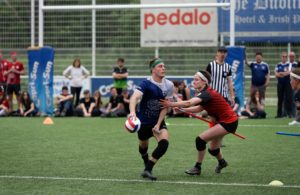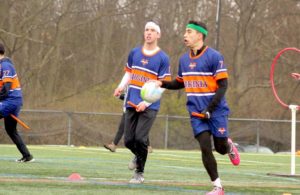- Rule, Britannia, no more?
- Unpopular Opinions: US Quadball Cup 2023
- Proven Contenders: University of Virginia
- Proven Contenders: Rutgers University
- Proven Contenders: University of Michigan
- Proven Contenders: Creighton University
- Different Perspectives: A Look Inside USA Ultimate
- Antwerp QC, Much of Belgian Core, Leaves Competitive Quidditch
Quick Takes: MARC
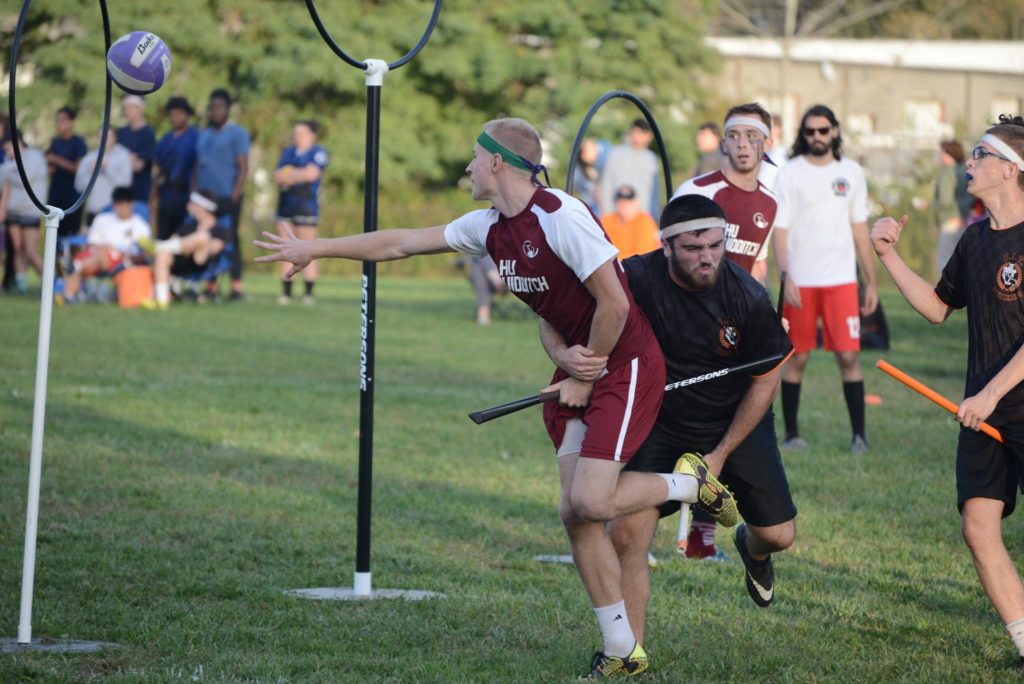
- Credit: Joe Niederberger
By Erik Morlock, Guest Correspondent
Will Pennsylvania’s first Mid-Atlantic Regional Championship mark the rise of Pennsylvania’s quidditch teams?
This year’s Mid-Atlantic Regional Championship is the region’s first hosted in the state of Pennsylvania, bringing with it a potential resurgence of Pennsylvania-based quidditch teams.
Penn State University (5-3)
Penn State University was thought to be an early frontrunner to take a stab at the upper tier of college play in the region this year. However, the Nittany Lions lost badly to an up-and-coming University of Pittsburgh team 200*-70 at the Penn State Nittany Invitational. If Penn State’s loss was an anomaly, they are still contenders, which could mean a rematch of the 2015 regional quarterfinal with University of Maryland that saw Penn State come out on top. If it wasn’t, the mysteries surrounding the team could be advantageous.
University of Pittsburgh (6-2)
University of Pittsburgh–commonly known as QC Pitt–is bursting back into the Mid-Atlantic after a season in the Great Lakes, where they finished the 2016-17 season 4-12. As previously mentioned, Pitt outperformed all reasonable expectations with a huge win over Penn State and an overtime loss to Bowling Green State University at the Penn State Nittany Invitational. Stephanie Bergan leads the team’s redemption season that already has more wins than they had all last year. But this explosion doesn’t come with its own native concern. Ask oddsmakers why the NHL’s New Jersey Devils are so slow to earn respect from oddsmakers despite being one of this year’s hottest teams. It certainly has to do with the fact that they finished last in the Eastern Conference last year.
Lock Haven University (3-5)
A now established force in the region, Lock Haven University is poised to do some damage this weekend. It might be easy to dismiss a team that has lost 63 percent of its games, but the team deserves a second look. Lock Haven has played Maryland to their second-closest college game of the season, only losing by 60. Furthermore, Lock Haven hits the heavy weights with a notably high strength of schedule (including two losses to The Warriors), boasting the highest in the Mid-Atlantic and tied for 11th highest in the country.
Philadelphia Honey Badgers (8-4)
The Philadelphia Honey Badgers enter the community division of the Mid-Atlantic Championship as a team most have written off, but DCQC and Nomads Quidditch should keep an eye on the rearview mirror. The Badgers have an in-range loss to University of Virginia and an 80-point loss to The Warriors. This is certainly comparable to DCQC’s results that include an in-range loss to Virginia and an out-of-range loss to Maryland, who went to then lose out of range to The Warriors at Turtle Cup.
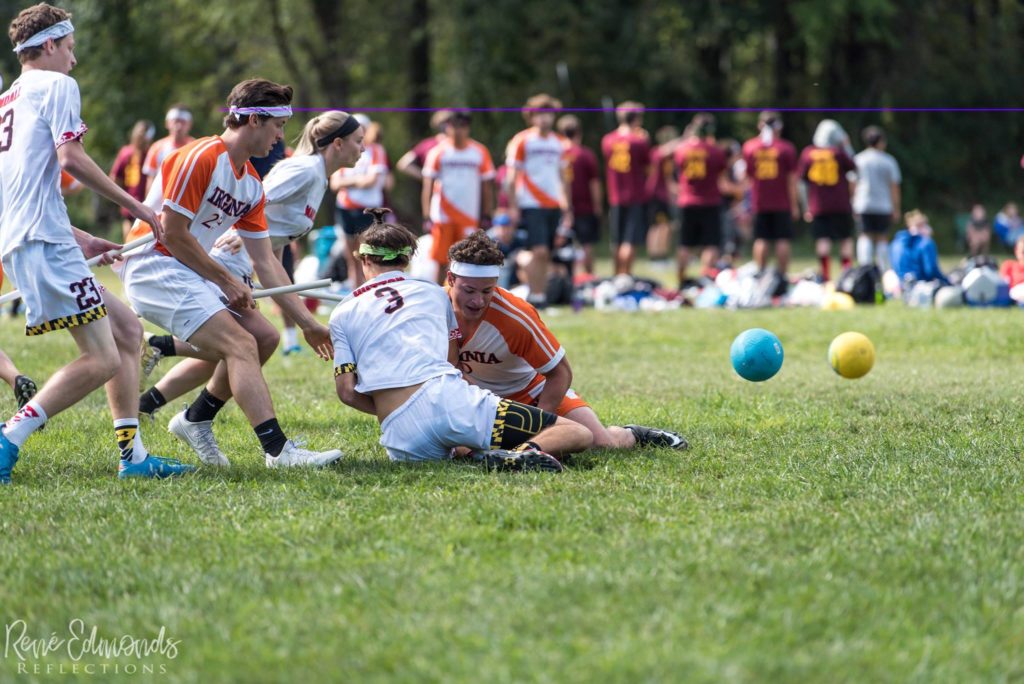
Credit: Rene Edmonds
Who will challenge those at the top?
Two teams have come close, but no college has provided any reason to doubt that Maryland is the front-runner for the collegiate title. Dale Farnan’s squad has proven yet again that Maryland enters another regional looking down at the rest of the region. They currently have exactly one loss to their name (against The Warriors in the finals of Turtle Cup) and are 10-0 against college squads–their best mark since going 12-1 prior to the 2014-15 Mid-Atlantic Regional Championship.
University of Virginia (11-3) enters this weekend as the second-highest ranked college team in the region, according to USQ Standings. They have earned this ranking with wins over UNC, DCQC and a snitch-range loss to Maryland. In fact, they are the only college team to have played Maryland to a loss of less than 60 this year. This may not come as a surprise as Virginia was eliminated in last year’s regional semi-final by The Warriors, whom they had beaten on day one of the same tournament.
Expect Virginia’s game to feature its traditional zone-defense, but with a new twist: offense. The Wahoos are averaging 122 points per game, 42 more points than their running average prior to regionals in the last three seasons. Their best offensive season prior to this year,2015-16, was still 22 points below this mark.
University of Richmond (7-3) rounds out the first page of the USQ Standings with out-of-range losses to Virginia and DCQC. Richmond has proven that they might get knocked down, but they can get back up again as they rebounded from the 70-point loss to DCQC with an overtime loss to the community squad in bracket play of the same tournament, Turtle Cup. Other regional favorites must be weary of the Richmond program that has historically been focused around beating and seeking their way to victories.
But let’s not forget the new kid in the region: Ohio University. Ohio has shown promise this season. They’ve matched well against Great Lakes qualifiers Bowling Green and University of Miami (OH) as well as national contender Rochester United. Although they lost to Pittsburgh early in the season with a short roster, they avenged themselves at their most recent tournament when they ran away with the rematch as well as handedly defeated West Virginia University. Ohio should not only be looking to qualify this weekend but win their pool and more.
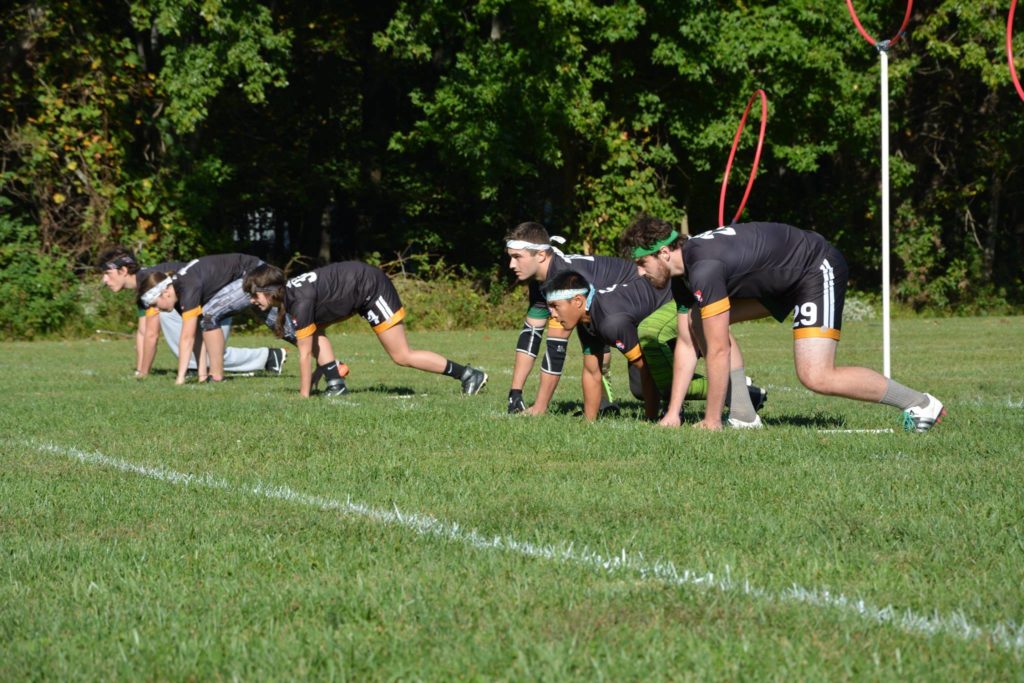
Courtesy: Serena Angone
Which teams snag the bottom bids?
The top-10 college teams, according to USQ Standings, are: Maryland, Virginia, Pitt, Penn State, Richmond, Lock Haven, Virginia Commonwealth University, George Mason University, Virginia Tech and West Virginia University. There’s a notable absence here: UNC.
Despite drastic turnover, that is a massive shift for a team that was in the Elite Eight in the 2014-15 season. Stability from experience are likely to take over as the opportunity for the bid comes to fruition.
So who remains to fight for the bottom bids? George Mason University, Virginia Tech, and West Virginia will likely be left to scrummage for the last two spots.
Up until the 2016-17 season, George Mason seemingly always found a way to the national stage. This year should mark their return, as they typically fare evenly with at least the middle-tier of qualified teams. Even in a slump, they should handle the bottom of the pack.
Virginia Tech (2-8) is also returning to the Mid-Atlantic after taking a year off from USQ-official play. Going unofficial is normally an identifier that the team is lacking in turnout or dedicated leadership. However, this does not seem to be the case with Zach Gregorian at the helm of the Phoenixes.
West Virginia (3-8) looks to earn their first USQ Nationals berth. Three of their losses come with suicide catches against top talent like Bowling Green and Pitt. If their quaffle line can keep the important games in-range, they’ve proven their seekers can hang with the rest of the region.
Expect DCQC to battle it out with the Nomads for the second club team bid. The two teams split games at Acromantula Cup. DCQC was leading in quaffle points at the time of each grab but never quite pulled out of range. Nonetheless, the wins before the catch tie-breaker could be have serious post-season implications for these two.
Player to Watch (alphabetical order)
Chasers
- Abbie Waters – Maryland
- Austin Hartman – Lock Haven
- Brittany Huffman – Virginia
- Chitose Hayashi – UNC
- Gates Young – Virginia
- John Sheridan – Maryland
- Matthew Cooper – Virginia
- Sam Beeler – Ohio
- Tyler Wilkinson – Ohio
Keepers
- Brian Davies – George Mason
- Dale Farnan- Maryland
- Garrett Sadtler – Maryland
- Justin Cole – UNC
Beaters
- Austin Howe – Ohio
- Dylan Heaney – Richmond
- Melissa Smith – Maryland
- Rhyan Stone – UNC
- Zane Bhaila – Maryland
Seekers
- Brenden Hutton – Maryland

